Character Creation — Races
|
Faerun is popuated with hundreds of species, many of whom are intelligent and therefore, depending on your Dungeon Master,
available for selection as the race of a Player Character. Comparatively speaking, BioWare is a fairly strict DM, as in BG you have only seven races to choose from (and in BG1, only
six). Still, those 7 races allow for a pretty broad spectrum of racial traits—the most important aspect of your Race is that it determines what Class options will be open to you, but
each race has some important secondary properties as well. The table that lists what classes (and, in the case of Specialist Mages, which kits) are available to which races is at the
bottom of this page. (Note that even though I mention sub-races for some of the entries below, that does not mean that the game will allow you to choose to play as a sub-race. I include that in the race's description merely for flavor.) | 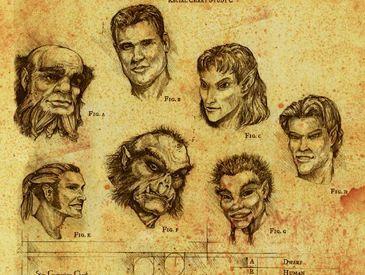 |
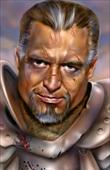 | Humans are the basic, archetypal race, so I'll start with them. They are "normal" in that they have no bonuses or penalties to their Thieving Skills or Saving Throws, and their fundamental stats all range between 3 and 18, with no modifiers at all. They have no unusual resistances or immunities to anything, and they have no racial preference for any particular sort of weapon. They seem pretty bland, but they are actually unique in that they are the only race that can take every single class and kit, as well as the only race that can Dual-class. They are found in almost every nation and society over all of Toril, living in every type of climate and terrain, and worshipping gods of all alignments. Humans from the south of Faerun, in areas such as Chult and the Shaar, tend to have brown skin and exclusively black hair, while the skin of Humans from Kara-Tur is yellowish. Unlike the other races, wherein differences in physical characteristics denotes a separate sub-race, these distinctions in physiognomy seem to indicate no meaningful differences whatever. |
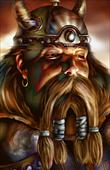 | Dwarves are most noted for being rugged and hardy, capable of great feats of endurance, and for this reason their Fighters are much respected in the Realms. Their Thieves mostly excercise the typical Dwarven fondness for metalwork and tools, by excelling in the areas of lockpicking and setting & disarming traps. They have great reverence for their gods, and many become very devout Clerics . . . but as a race they have a general distaste for arcane magic, and Dwarven Wizards are almost unheard-of. As far as maximum stats are concerned, Dwarves are well-known for having strong Constitutions, and can roll as high as 19 CON, but they tend to be a bit clumsy, as well as surly in their dealings with other races: They are limited to 17 Dexterity, and 16 Charisma. But Dwarves do have some truly excellent Saving Throw bonuses: Depending on their Constitution score, they will recieve -1 to -5 bonuses to their Save vs. Death, Save vs. Wands, and Save vs. Spells. Dwarves in general tend to be Lawful, and also Good, but each Dwarf places service to his own clan at a higher priority than Dwarven society in general, and some clans do favor Evil, so Evil Dwarves are not that rare—in particular, the Duergar and Derro, two subraces of Dwarf, are almost exclusively Evil. |
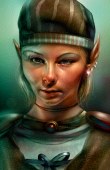 | Elves are in many ways the opposite of Dwarves: They build cities in forest canopies while the Dwarves mine out underground palaces, and favor silent ambushes where Dwarves would prefer to make a frontal assault. As a race, they tend toward being Chaotic Good in alignment, although one Elf subrace, the Drow, are notorious for their Evil nature and deeds. Elves place great stock in both physical combat and magic, so skilled Warriors (Archers in particular) and Wizards win great prestige in Elven society. All Elves are nearly immune to Sleep and Charm spells: Any Sleep or Charm effect cast at them has a 90% chance to fail. They have moderate bonuses to their Stealth skills, and the Favored Weapons of Bows and Swords: They enjoy bonuses of -1 to THAC0 & +1 to Damage when using any hilted weapon from a Short Sword to a Two-Handed Sword (including more exotic weapons like Ninja-to), as well as any launcher that fires Arrows. Physically, Elves are a little shorter than Humans but noticably more slender, neither sex grows any facial or body hair, and their muscles are very dense, so an Elf can be quite strong indeed while still looking like what a Human would consider to be "skin and bone." An Elf reaches physical maturity in his mid- |
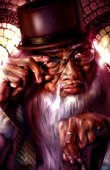 | Gnomes are known for their cleverness, sense of humor, and willingness to get along and commingle with other races. They delight in practical jokes (in fact, it's their primary method of flirting with the opposite sex) and making other people feel awkward, and they have a great fondness for complexity; either taking things apart to see how they work, or building things intricate enough to arouse this interest in their fellows. Naturally, this means that those who become Thieves grow to be quite good at it, and their skills in arcane wizardry are also notable, to the point that they are adept at predicting and avoiding spells cast by other people. Gnomes are a little shorter and noticably less broad than Dwarves, and most have skin tones in varying shades of brown. Some Gnome men sport goatees or other sparse facial hair, while others grow full beards. Like Dwarves, there are differing opinions on whether or not Gnomish women have facial hair; again, like Dwarves, Gnomish Females look exactly like their male counterparts in BG1, but get their own avatar and paperdoll in BG2. To reflect their inquisitiveness and cunning, all Gnomes can reach as high as 19 Intelligence, but their Wisdom rolls are capped at 17. Depending on their Constitution score, they |
 | Halflings are optomistic, highly curious, unselfish, and rather rustic in their ways and preferences, with little interest in elevated or refined tastes—they would much prefer a catchy dancing tune to a recitation of lyric poetry. When Halflings reach adolescence in their early- to mid-twenties, the more rambunctious individuals typically take up adventuring, heading for a watering hole where travellers can be found, and wait to join up with the first band of likely prospects who would benefit from their addition. They usually do not have to wait long, as Halflings have many traits that can make them very useful: Their years of playing pebble-throwing games gives them racial -1 THAC0 and +1 Damage bonuses when using a Sling, their natural resilience is expressed as their having the same Saving Throws as a Dwarf with a similar Constitution score, and their innate knack at several Thieving skills, is well-known. A Halfling's period of wandering and adventuring can last for weeks or years, depending on the individual: Some tire of the Life rather quickly, while others quite enjoy it. Once settled down, they typically exchange the slender, trim silhouette from their adventuring days with a noticably more well-nourished body shape. A Halfling's natural lifespan averages |
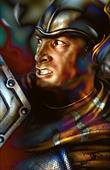 | Half-Elves are the offspring of Elves and Humans, or any other mixture of Human and Elven blood. Those that live in Elven society are known as Half-Humans, but because Elf communities tend to be insular and xenophobic most Half-Elves grow up with their Human parents in Human settlements. Depending on the amount of Human vs. Elven blood in their veins, they exhibit a visible mix of the physical characteristics of their races, and thus run the risk of being called derogatory names by Human youths and their ostracizing ways. Most Half-Elves (except those whose mothers were raped by Drow) have parents of Good alignment, but a Half-Elf who feels outcast may rebel and take any alignment at all. They can take up a spectrum of adventuring professions almost as broad as that of their Human relatives. Their natural lifespans are about 150 years long, and they have a 30% resistance to all Charm and Sleep effects cast at them. Half-Elves lean towards being a bit more graceful and healthy than Humans, but only on average. Due to their tendency to be outsiders during childhood, they are slightly more adept at petty larceny, but otherwise have the same Saving Throws, maximum stats, and Thieving skills as their Human kin. |
 | Half-Orcs have extremely difficult childhoods. They are almost always the result of rape (both Humans and Orcs find each others' females so profoundly unattractive that the only ways a coupling could occur are through a warrior seeking to impress his comrades with a display of cruelty, and/or through sheer blind drunkenness), and those few that manage to avoid infanticide are inevitably ridiculed by adults and their fellow children alike, reviled among Humans for being the bastard mongrel spawn of evil monsters, and scorned by Orcs for being the weak mewling cub of the soft-bellied pinklings. Like Half-Elves, these outcast rogue adolescents have the potential to turn towards any alignment, but unlike Half-Elves the constant reminder of the brutality of their origins pressures them to think of the world as a cruel, hard place to live, and therefore Half-Orcs tend to be Chaotic Evil, especially since the only way a Half-Orc can gain any sort of respect is by returning to Orcish society (Half-Orcs becoming trusted members of Human settlements are almost unheard-of) and displaying great prowess as a warrior. Only male Half-Orcs may walk this path, as Orcs allow their women to become only priests, never warriors. Of course, most Half-Orcs of both |
|
Y = Yes D = Can be achieved through Dual-classing 1 = Conjurer, Diviner, Enchanter, Transmuter, or Wild Mage 2 = Diviner, Enchanter, or Wild Mage 3 = Illusionist only If a race can take a class, it can also take all kits of that class, except where noted with the Specialist Mages. |
 Back to Back toClass Combinations |  Up to Chapter 4 |